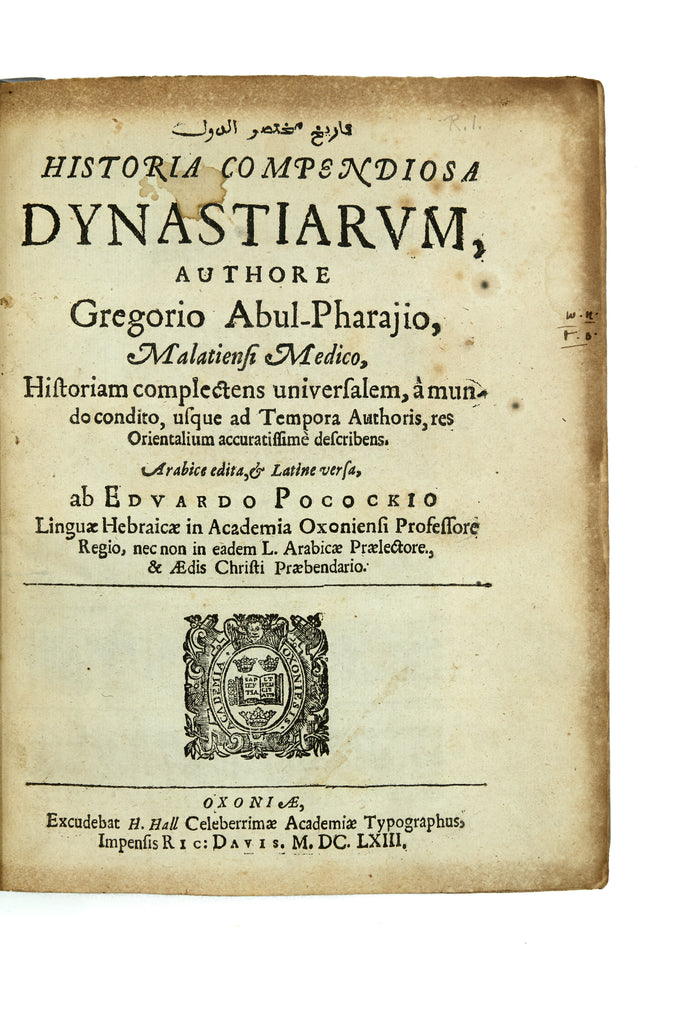Historia Compendiosa Dynastiarum
ABUL-PHARAJIO, Gregorio [i.e. Gregory Bar Hebraeus or Abu'l-Faraj]. [tr.Edward Pococke]



Oxford: H.Hall. Impensis Ric: Davis. 1663.
First edition thus in the Arabic edition and Latin translation by Edward Pococke. 4to. 203x155mm. pp. [12], 368, [90], 66, [5bl], 565, [2]. The final part (565, [2]) in Arabic paginates from the rear of the book. The two blanks are present. Three parts in one volume (i.e. the Latin translation, the Supplementum and the Arabic edition), each with its own title page. Bound in twentieth century brown full calf by Sangorski and Sutcliffe, lettered in gilt to spine. Contemporary manuscript title to fore-edge. Some light fading to the spine, slight toning to edges of first and last leaves and a small hole to foot of the final leaf (not affecting the text) but overall in very good condition throughout. Front pastedown has the bookplate of the Middle East scholar R.M.Burrell. His important library of books on the Middle East was sold by Sotheby's in 1999 (this was lot 319).
On 17th October 1630, Edward Pococke (1604-1691) arrived in Aleppo as Chaplain of the Levant Company. While there, he deepened his study of the languages and culture of the region and began to collect Arabic manuscripts. In 1636, Pococke returned to England at the request of Archbishop Laud who had recently established a Chair of Arabic at Oxford and wanted Pococke to be the first holder of it. One of the manuscripts brought back by Pococke was the al-Mukhtasar fî'l-Duwal ('History of the Dynasties') of Abu'l-Faraj (Bar Hebraeus, 1226-1286). The lack of material in England on Islamic history and geography meant that Pococke felt unable to prepare his edition and translation and so he secured a sabbatical from Oxford and sailed for Constantinople where he spent the next three years collecting manuscripts. He returned to England shortly before the outbreak of the Civil War and it was only in 1650 that he published extracts from the "History" in his Specimen historiae Arabum which included other material culled from his now extensive collection of manuscripts. Pococke was a Royalist and the years of the Protectorate were hard: he almost lost his professorship and his priestly living. At the Restoration he returned to Oxford and began work on the complete Historia Compendiosa Dynastiarum. Finally, in 1663, almost thirty years after Pococke had returned from Aleppo with the manuscript of al-Mukhtasar fî'l-Duwal his far-reaching Historia which opened up Arab history to Western was published and "remained the standard edition until the twentieth century" (ODNB).
First edition thus in the Arabic edition and Latin translation by Edward Pococke. 4to. 203x155mm. pp. [12], 368, [90], 66, [5bl], 565, [2]. The final part (565, [2]) in Arabic paginates from the rear of the book. The two blanks are present. Three parts in one volume (i.e. the Latin translation, the Supplementum and the Arabic edition), each with its own title page. Bound in twentieth century brown full calf by Sangorski and Sutcliffe, lettered in gilt to spine. Contemporary manuscript title to fore-edge. Some light fading to the spine, slight toning to edges of first and last leaves and a small hole to foot of the final leaf (not affecting the text) but overall in very good condition throughout. Front pastedown has the bookplate of the Middle East scholar R.M.Burrell. His important library of books on the Middle East was sold by Sotheby's in 1999 (this was lot 319).
On 17th October 1630, Edward Pococke (1604-1691) arrived in Aleppo as Chaplain of the Levant Company. While there, he deepened his study of the languages and culture of the region and began to collect Arabic manuscripts. In 1636, Pococke returned to England at the request of Archbishop Laud who had recently established a Chair of Arabic at Oxford and wanted Pococke to be the first holder of it. One of the manuscripts brought back by Pococke was the al-Mukhtasar fî'l-Duwal ('History of the Dynasties') of Abu'l-Faraj (Bar Hebraeus, 1226-1286). The lack of material in England on Islamic history and geography meant that Pococke felt unable to prepare his edition and translation and so he secured a sabbatical from Oxford and sailed for Constantinople where he spent the next three years collecting manuscripts. He returned to England shortly before the outbreak of the Civil War and it was only in 1650 that he published extracts from the "History" in his Specimen historiae Arabum which included other material culled from his now extensive collection of manuscripts. Pococke was a Royalist and the years of the Protectorate were hard: he almost lost his professorship and his priestly living. At the Restoration he returned to Oxford and began work on the complete Historia Compendiosa Dynastiarum. Finally, in 1663, almost thirty years after Pococke had returned from Aleppo with the manuscript of al-Mukhtasar fî'l-Duwal his far-reaching Historia which opened up Arab history to Western was published and "remained the standard edition until the twentieth century" (ODNB).
